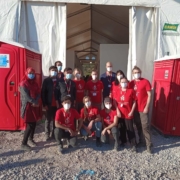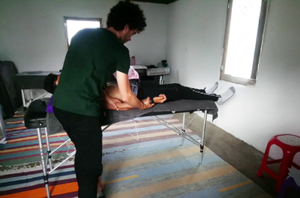MVI provides humanitarian aid. The NGO works at three locations in Greece with volunteers, doctors, nurses and translators to provide medical care for refugees. In particular, refugees who are staying there illegally and therefore have no access to health care are being supported by MVI. But how does the work actually unfold? What are the difficulties the volunteers face? And where exactly does the medical treatment take place? Kai Wittstock, team coordinator and founding member of “Medical Volunteers International” (MVI) has responded to these questions.:
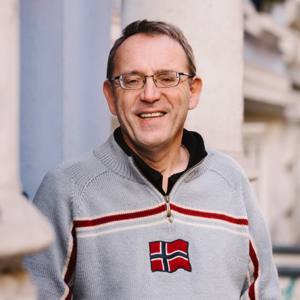
Kai Wittstock (Founder and Volunteer Coordinator of Medical Volunteers
What help does MVI offer?
We provide medical care to refugees in Greece who have no access to the health system there. We are currently working in three exact locations: In Athens, Thessaloniki and Lesbos.
What exactly does “Medical Volunteers International” do at the different locations?
In Thessaloniki we have a so-called Car Park Clinic, where we drive with our ambulance and treat about 100-200 people a day. These are people who do not want to register in Greece. That means they are not able to go and visit a Greek doctor.
So a lot of people are there illegally?
Yes, and yet they still need medical attention. We simply provide humanitarian aid. But we also look after the Diavata Camp with the approval of the Greek Ministry of Health. It is a camp with about 2000 people. There we offer our medical treatment together with a Greek doctor in a container.
Recently we also opened our own clinic with two treatment rooms. An NGO from Switzerland provides the food. That’s how the cooperation works and our volunteers are excited about the process.
So what are these rooms you can use and who do you get them from?
In Athens, for example, we currently have 12 “clinics”, in squatted houses and squatted schools. We also provide doctors and nursing staff for other NGOs that have their own treatment facilities. Furthermore, we drive 2 times a week in camps in the surrounding area. For example, there is a camp in which about 2000 people have to live at the moment, mainly women and children. There we treat the refugees in a community center of an American lady, because we do not have direct access to the camp there. In addition, we drive to the south of Athens, which has 3 camps where there is no medical care from the Greek side.
Treatment rooms in occupied, empty houses?
Anyone who’s been to Greece knows that every tenth building is empty. Many people come via the Greek islands and also via Turkey, who then live in the city parks. And then activists take care of them and give them shelter in empty schools or in these empty buildings.
Often this happens with the tolerance of the Greek landlord or the Greek authorities. They know there’s no alternative! The problems of the Greeks should not be underestimated. An example: There is an occupied school in Athens that is inhabited by 200 people – and has been for two years.
It is hard to imagine that treatment can be carried out in apartments that have been “diverted from their intended purpose”?
We have cases where people have to have their toes removed because of frostbite. Of course, this is done in the hospital – however, there is no longer any follow-up treatment. This is where we come and take care of that. We also get apartments: Because if someone has just had hip surgery, he can’t climb to the 3rd floor in a squatted house.
These are all individual fates in which we have to decide on the spot, because of course it all costs money. It also happens that schooling is provided for refugee children, but only under the condition that all children are checked and given a health certificate after the examination. In this case, MVI took over, examined 200 children, carried out vaccinations and issued the vaccination passes.
That’s what distinguishes us: We are very flexible and extremely well connected in Greece. When help is needed, we’re there!Und das kann wahrscheinlich jeden Tag etwas anderes sein.
Sometimes trains arrive in Thessaloniki at three o’clock in the morning, in which 200 people are arriving via Turkey. They don’t have anything! Nothing. So our task is to go there and hand out clothes and food with partner organisations and supply the people with medication.
So the conditions in Greece do not allow any state supply?
Let me give you an example: In Athens itself, we stay in the centre of the city in a small house where we look after Greek homeless people. They have access to the health system, but have to pay for associations etc. themselves – and they simply cannot effort it.
Through donations, however, MVI is able to offer medicines and bandages. This applies to all our locations. To put it briefly: even with access to the healthcare system, many sick people cannot afford afford to go to the doctor!
The languages of the refugees are certainly a problem as well when it comes to medical care. Greek or English will be the least spoken languages I assume…
…sure. That’s why we have to work with translators. We currently have an Arabic, a Kurdish and a Farsi translator, because otherwise our doctors are unable to understand anything. In order to pay at least a pocket money for their work, we urgently require donations.
Why can’t the issue of illegal residence be resolved?
On the one hand, many do not want to register, as registration under the Dublin II Regulation would mean that they would no longer be able to “get ahead”. And the only hope for many of them is to get to Northern Europe.
On the other hand, there are many Afghanis, Pakistanis or North Africans who cannot be recognized by the government…
…this affects especially many fugitives in Lesbos at “Moria-Camp”…
…who have no status at all. This is indeed a particular matter on Lesbos which has to be resolved. The Greeks don’t know how to deal with it. They do not want to bring people to the mainland and expect to get solutions from the EU. There are really catastrophic conditions, as you can now also see in the German press.
What’s MVI doing there?
We provide humanitarian aid! We help those who have no access to medical support, who basically have nothing at all. No food and no clothes.
There we have 2 treatment rooms. The overload at Moria Camp is extreme! So medical helpers have about 2-3 minutes for a patient consultation or treatment. More complicated cases come to us and on those we work together with a Swiss NGO.
What’s the most important thing? Money donations, equipment or medication?
There are 800 patients a week, which means about 3000-3500 patients a month, so predominantly medication is very important. Moreover, we are the only ones who take care of chronical cases such as epilepsy – and that’s expensive.
We also need to keep the team on the move: We got an ambulance in Thessaloniki and a rental car on Lesbos. In Athens, we need cars to get to the camps. That means money for insurance, gas, reparation, etc. And as I mentioned before, we are also in great need for donation money in order to be able to provide the translators who accompany us several days a week.
And it would be fantastic if we could compensate our permanent coordinators on site and in Hamburg for their time-consuming work in the mid-term. Some of them work full time for the project and at the moment they have to collect money privately in order to be able to survive.
The main part of the work is done by the many volunteers. Can you briefly describe the work they do?
It’s an incredibly flexible way to work and the main concept of it is teamwork. It is not always easy, as you can imagine. But the volunteers also tell me again and again, that this experience proves to be important and enriching. Regarding the medical care and support, for many students, especially who study medicine, working alongside with doctors is an incredibly important aspect of their practical education.
We are completely international: A team usually consists of 8 people who come from different countries, so you also learn different treatment methods.
Perhaps the best description would be what an English doctor told me once when I asked her about her experiences: “Every day is a new challenge”.
That’s what it is.
The interview was conducted by Patrick Thielen on 20.03.2019

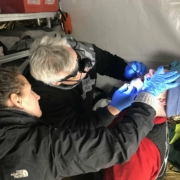
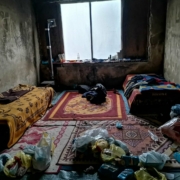
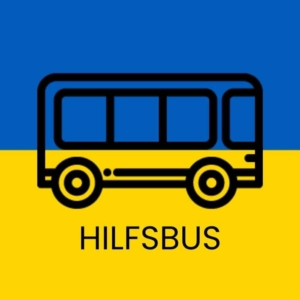
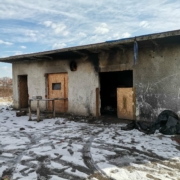
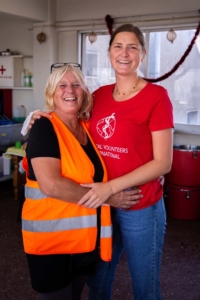 Thanks to the motivation and passionate commitment of the team, the complicated operation on his shoulder was successfully carried out. It was like the task of a puzzle, the pieces of which had to be put together step by step. Day after day, the young man’s wound from Pakistan was treated by our team. The shoulder had to be immobilized for 45 days in order not to endanger the healing process.
Thanks to the motivation and passionate commitment of the team, the complicated operation on his shoulder was successfully carried out. It was like the task of a puzzle, the pieces of which had to be put together step by step. Day after day, the young man’s wound from Pakistan was treated by our team. The shoulder had to be immobilized for 45 days in order not to endanger the healing process.